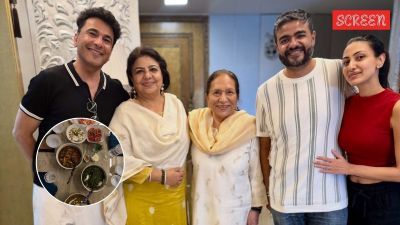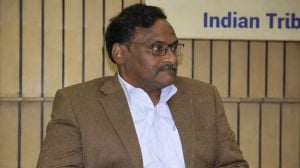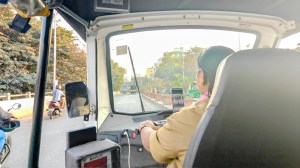Hindu, Muslim8230;.
Gaatha. A story with no end. About two families from different communities caught up in a whirlpool of uncertainty, where old equations are...

Gaatha. A story with no end. About two families from different communities caught up in a whirlpool of uncertainty, where old equations are changing and established edifices crumbling.
This latest Ramesh Sippy serial begins in 1942 Delhi and traces the families8217; reactions to momentous events: the Quit India andolan, Partition and post-Partition dreams and nightmares, right upto contemporary times.
quot;The theme is the tanaav between the two neighbours and between them and the outside world,quot; explains Sippy. It is a serial about Hindus, Muslims and the experience of Partition. It has taken two old hands to combine forces once again and create a compelling fictional account of the struggle for independence. For Gaatha, Sippy has writer Manohar Shyam Joshi as scriptwriter. Together, they had created the memorable Buniyaad.
The head of the Hindu family is Durgaprasad Shri Vallabh Vyas. He is convinced that the British Raj will survive for ever. He even dreams of a knighthood! quot;The irony is that he while he is pro-British, his only son is an active member of the Congress party,quot; says Vyas. Sharing his ideological beliefs is his daughter-in-law, Rajashree Alka Kaushal. quot;She is a lady in total control of the family and opposed to her husband8217;s Gandhian views,quot; says Kaushal. Her husband is Ramprasad Rakesh Pandye. quot;He is a soft-spoken guy who goes to jail for the Movement,quot; says Pandye. Supporting him is Durgaprasad8217;s granddaughter, Jayshree Mansi Joshi. quot;She is a shy, sensitive girl who believes in the revolution,quot; says Joshi. But she lives in a epoch when girls are supposed to remain silent and in the kitchen. Durgaprasad8217;s grandsons are a mixed bunch with the eldest influenced by the British, the other a psuedo-Gandhian and the third too absorbed in wine and woman to care for what is happening around him.
The Muslim family head is Ashfaq Pariksha t Sahni. quot;He is completely apolitical and merely wants to be left alone,quot; says Sahni of his character. Ashfaq8217;s problems include clinging to past beliefs and a rayizi which no longer exists. His family members are again of the assorted type with some being nationalist, others pro-British and still other packing their bags later on for Pakistan. quot;The Muslim family too has the same currents and undercurrents as the Hindu family,quot; adds Sahni.
The first episode, 9 pm, Tuesday August 19 on STAR Plus, has British dignitaries at a birthday party hosted by Durgaprasad. In the middle of it, Ramprasad announces that Gandhi has launched the Quit India movement.. Ramprasad is arrested and his father suffers a heart attack. quot;Coincidentally, we shot that scene on August 9 the same day that Gandhiji actually made his declaration,quot; says Pandye.
Though Delhi forms the backdrop, the Sippys found that the city had changed radically along with its vintage nukkads and bazaars. So they shot the outdoor scenes in Rajkot and the interiors of Gujarat. Also, footage from the pre-Independence period has not been used as quality and consistency would have suffered. quot;But the character keep referring and reacting to actual events,quot; says Sippy.
Indoor shooting is being done at an impressive set at Film City, Mumbai. Attention has been paid to minute details from tables and chairs to the grandfather clocks and switches. Most of the furniture was brought from Delhi and the costume were designed after extensive research. quot;We have even changed the electrical wiring to make the serial more authentic,quot; says Rohan Sippy. quot;The serial is organic and the dialogues are pithy and succinct. It brings out the atmosphere of that epoch,quot; feels Sahni. For him, Gaatha is a walk down memory lane as he is from Rawalpindi and his grandfather8217;s best friends were the Muslim neighbours. quot;They still write letters to me. There is nothing religious about politics,quot; he asserts. And Gaatha says just that.
- 01
- 02
- 03
- 04
- 05































